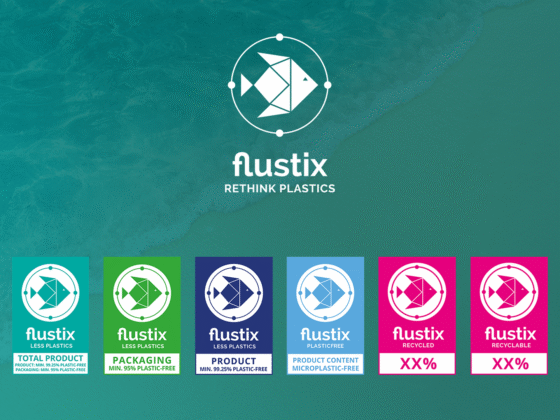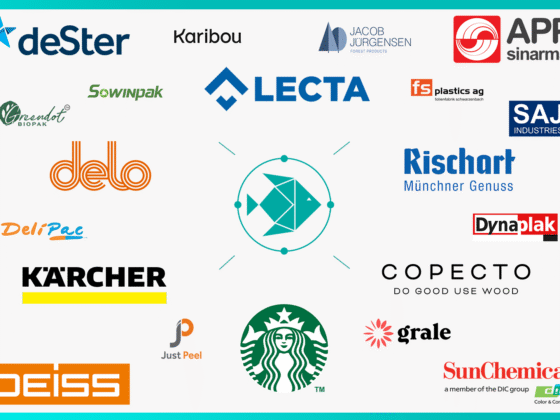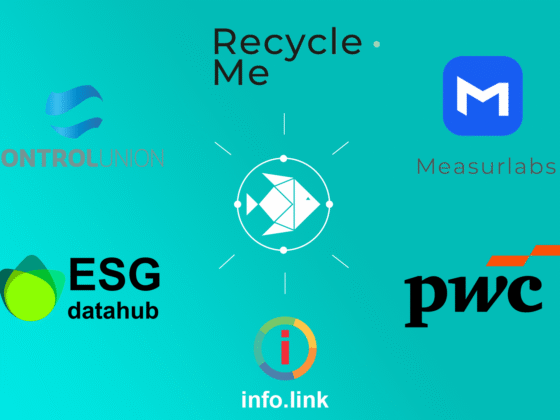The new mandatory offering of reusable packaging has been in force since January 1, 2023. Businesses must now offer consumers reusable alternatives for food and beverages they take home. How does that work? We from flustix have looked around and made a first practical test.
At Dunkin’ Donuts, the disposable cup rules
The lobby of Hamburg’s main train station, Sunday afternoon, it’s just after 2:30. Travelers crowd the Dunkin’ Donuts stand, ordering donuts and coffee to go. The new offering of reusable packaging law is exactly eight days old on this day. But there is nothing of it to be seen. Nothing at all? Not quite. A small A5-sized display points out a reusable alternative – for a two-euro deposit. This does not meet any approval. All hot drinks that go over the counter in the barely ten-minute waiting time, end up in the conventional disposable cups.
Salads, juices, wraps – healthy things are only available in disposable packaging
A few steps further, we are standing at Mr. Clou’s, a supplier of juices, salads, wraps, and bowls. The refrigerated counter is full, all the goods are in disposable packaging. Reusable alternatives? Not a chance. You don’t have to be a gastronomy professional to realize: The way the stand is designed, no reusable solution would be possible here at all. The food is already packaged, and there is no room to put anything into other containers. And if, then it would have to be out of an already filled packaging and put into a reusable container after – which makes no sense and is also prohibited.
Burger King uses a countrywide deposit system
Let’s move on to Burger King. Here, you can get cups from Recup, Germany’s largest deposit system with around 18,500 dispensing points nationwide. Cups and lids each cost a one-euro deposit. Alongside soft drinks, milkshakes and ice cream can also be ordered in Recup cups. After being used, the containers can be returned to Burger King stores and all other dispensing points, where they are rinsed and sent back into circulation. A Recup cup, the fast food company promises on its website, can replace up to 1000 disposable cups in the course of its life.
McDonalds and Burger King use loopholes
At McDonald’s, things get more inconvenient. Just like Burger King, the fast-food giant (1430 stores in Germany) only offers drinks, milkshakes and ice cream in returnable cups. Burgers and fries continue to come in cardboard boxes – the first loophole in the new law, which makes exceptions for cardboard. Well aware of this temporary solution, the fast food companies had already begun to switch their packaging to cardboard solutions some time ago. Now there is supposed to be no more plastic in it (however, we don’t know for sure), but the waste remains. Moreover, it is annoying that the McDonald’s reusable system is a purely isolated solution. Anyone who uses reusable cups at McDonald’s must also return them there. For people who do not eat there frequently, this is rather impractical. Accordingly, the demand for reusable solutions this Sunday also turns out to be meager…
Deutsche Umwelthilfe calls for drastic tightening of the new rules
Sharp criticism of the new law comes from the German Environmental Aid (DUH). The obligation to offer reusables goes indeed in the right direction, but as long as the disposable items are not worse off, the regulation runs into the void. DUH is therefore calling for an additional levy of at least 20 cents on disposable tableware. DUH Managing Director Barbara Metz: “If reusable is to become the new standard for ready-to-eat beverages and meals, then the financial equality between them and disposables will not be enough – because without any improvements, the disposable option remains easier to use.”
Without return points, reuse makes no sense
The drop-off alone is not enough to get the cycle going anyway: Why would travelers choose a reusable cup at Dunkin’ Donuts in Hamburg if they can’t return it at their destination because there’s no store there? Or because that one is closed? Or no one else takes it?
Then the cup ends up at best in the kitchen cabinet and after a single use enjoys a sad existence as a useless reusable memorial. That is not yet really sustainable.
Local restaurants show how it’s done
It works better for regional restaurants, which primarily supply people in the neighborhood. In Hamburg’s Schanzenviertel district, several businesses use another great logistics system: Vytal. The advantage for consumers: Dishes can be borrowed free of charge and with no deposit. A QR code on the container is scanned and registered via the Vytal app. After consumption, one has 14 days to return the dishes to the restaurant. It’s a system that works in the neighborhood, but not so much when traveling. Unless you’re lucky enough to find a Vytal drop-off point at your destination, in which case they’ll also take back dishes from other partners. It must only be rinsed with cold water once.
Reveral suppliers negotiate joint take-back stations
For the reusable system to catch on, it needs take-back stations in public spaces, says Vytal founder Fabian Barthel. These would have to be operated by a neutral service provider that collects the containers, washes them, and returns them to the distribution points – regardless of which provider the dishes come from. At present there are three large offerers, who are currently in talks with each other, reports the newspaper Süddeutsche Zeitung. As of now, there is yet no agreement on joint take-back points.
Reverse vending machines already hang in Munich
The lack of unity is now being exploited by a small start-up from Switzerland: Kooky has set up 40 reverse vending machines in Munich that swallow Kooky cups and spit out deposits. The café that dispenses the cups pays Kooky a fee of between ten and 15 cents for cleaning and transporting the cups. By comparison, a disposable cup costs just under ten cents – which seems economically justifiable. A solution for the cups of other suppliers as well? Unfortunately, not: Kooky works with a chip technology that no one else uses – and therefore the machine does not accept cups from Recup or Vytal.
Disposable deposit machines as a model for food containers and beverage cups
So no solution in sight? Malte Biss, founder and CEO of flustix, points to the years-long struggle over the one-way deposit on cans and bottles: “This was decided in 1991, and only 15 years later did a uniform regulation come into force. Now we have the best one-way deposit system and thus a closed-loop system in the world for this type of container. At the very least, the path and implementation of the single-use deposit system could be a signpost for a reusable tableware system. It stands at the beginning and deserves every chance.”
What exactly is in the new law and for which businesses exceptions apply, read here.
 English
English Deutsch
Deutsch




